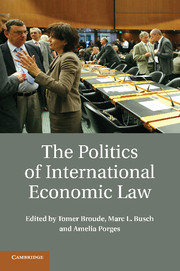Book contents
- Frontmatter
- Contents
- Contributor List
- Acknowledgments
- 1 Introduction
- Part I The Politics of Law Making in International Trade
- 2 The Politics and Indirect Effects of Asymmetrical Bargaining Power in Free Trade Agreements
- 3 The Politics of Linkages in U.S. Preferential Trade Agreements
- 4 The Politics of African Trade Negotiations in the WTO's Doha Round
- 5 The Politics of Legitimacy in the UNCITRAL Working Methods
- Part II The Politics of International Investment Treaty Making
- Part III The Politics of Sovereign Wealth and International Financial Law
- Part IV The Politics of Dispute Settlement in International Economic Law
- Part V Linkages between International Economic Law and Foreign Policy
- Index
4 - The Politics of African Trade Negotiations in the WTO's Doha Round
Published online by Cambridge University Press: 03 May 2011
- Frontmatter
- Contents
- Contributor List
- Acknowledgments
- 1 Introduction
- Part I The Politics of Law Making in International Trade
- 2 The Politics and Indirect Effects of Asymmetrical Bargaining Power in Free Trade Agreements
- 3 The Politics of Linkages in U.S. Preferential Trade Agreements
- 4 The Politics of African Trade Negotiations in the WTO's Doha Round
- 5 The Politics of Legitimacy in the UNCITRAL Working Methods
- Part II The Politics of International Investment Treaty Making
- Part III The Politics of Sovereign Wealth and International Financial Law
- Part IV The Politics of Dispute Settlement in International Economic Law
- Part V Linkages between International Economic Law and Foreign Policy
- Index
Summary
INTRODUCTION
Launched on November 14, 2001, the Doha Round of multilateral trade negotiations has experienced a lot of bumps and setbacks along the way. In late July of 2008, the Doha Round collapsed yet again after disagreement over trigger levels for special safeguard mechanisms (SSMs). The Doha Development Agenda (DDA) was supposed to put development at the center of trade negotiations and address the needs and concerns of developing countries. However, the failure to meet the deadlines set out in the Doha Ministerial Declaration and subsequent deadlines, and entrenched North–South divide over important issues in the agricultural negotiation, cast serious doubt on the commitments of World Trade Organization (WTO) member states to a true development-oriented outcome. Given the proposals on the table, important issues that have been left out of the discussions, and new trade-distorting and trade-restricting measures emerging in many industrialized economies in the wake of the global financial crisis, it would appear that the development objective of the Doha Round has been significantly watered down if not completely abandoned. With continuing delays in negotiations and as the development dividend of current proposals comes under increasing scrutiny, countries in sub-Saharan Africa (SSA), particularly the least developed countries (LDCs) among them, must begin to explore alternative paths to improving their trade performance and meeting their development objectives.
For Africa as a whole, several questions must be asked. Will the Doha Round provide real opportunities for advancing the continent's trade and development interests?
- Type
- Chapter
- Information
- The Politics of International Economic Law , pp. 64 - 105Publisher: Cambridge University PressPrint publication year: 2011
- 1
- Cited by

